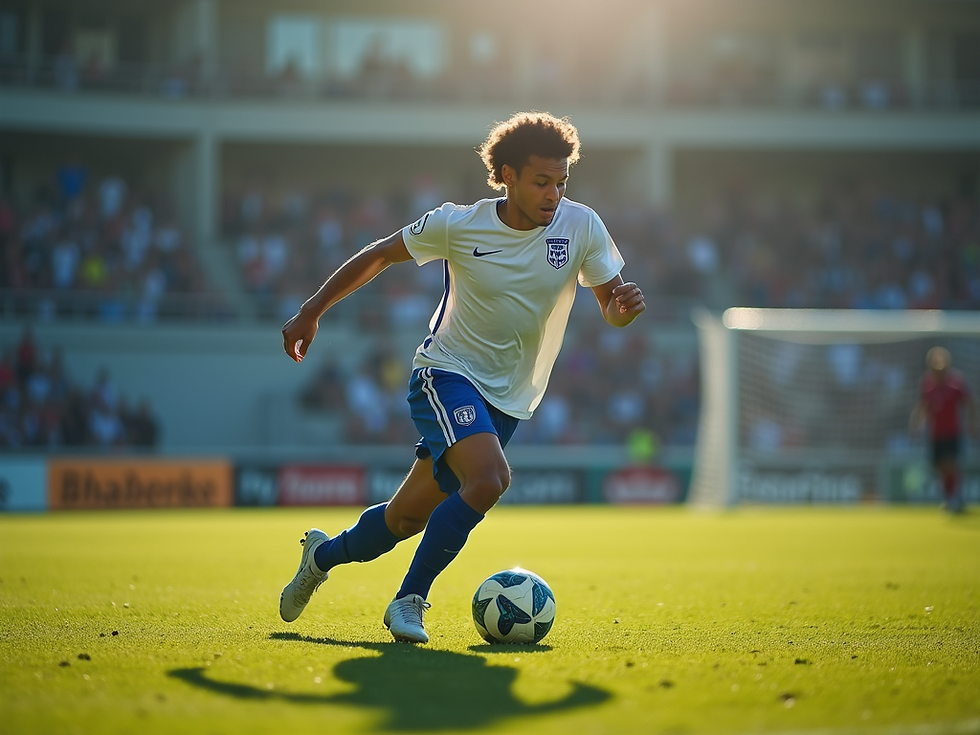How to Beat Nervous Game Anxiety: Pro Football Player's Guide
- Dr Paul McCarthy

- Sep 11, 2025
- 8 min read
Updated: Sep 12, 2025

Athletes know the feeling all too well - that pre-game anxiety that grips 30-60% of us at some point . My football career has taught me plenty about those butterflies in your stomach. They can either take your game to new heights or throw you completely off balance.
A small dose of adrenaline can boost your game, but excessive anxiety messes with your focus, coordination, and decision-making . Getting the jitters before a big match happens naturally. It usually signals readiness to perform, though it can reach a point where it starts to affect your game . The nervous game anxiety shows up as that overwhelming sensation when your nervous system kicks into overdrive during or before competition.
Many athletes wonder about playing the nervous game with confidence - I've seen this challenge affect my teammates even at the professional level. The bright side? You can become skilled at playing the nervous game. Research shows that simple techniques like deep breathing can reduce anxiety levels in athletes by a lot .
Let me share my professional experience about handling pre-game jitters in this piece. You'll learn to turn anxiety into your advantage and create a mental game plan that works under pressure. These strategies will help change that nervous system game into your winning edge.
Understand What Nervous Game Anxiety Is
The nervous game means much more than butterflies in your stomach before a match. Sports psychologists tell us that anxiety in sports is different from what we feel in daily life [1]. My years as a professional athlete taught me this runs much deeper than pre-game jitters.
What is nervous game and how it affects performance
Your body's stress response kicks in during competitive pressure, which we call nervous game anxiety. This affects both your mind and how you play. Sports psychologists break this down into two types: trait anxiety (part of your personality) and state anxiety (temporary feelings) [1]. State anxiety in competition splits into two parts: cognitive anxiety (worried thoughts) and somatic anxiety (physical symptoms) [1].
Nervous game anxiety and performance have an interesting connection. The more you worry, the worse you tend to play - that's cognitive anxiety's effect [1]. Physical symptoms can actually help you perform better up to a point, but then your performance drops [1]. This explains why some nervous energy sharpens your focus, but too much ruins your decision-making [2].
Common signs before and during a game
Nervous game shows up in several ways:
Physical signs:
Heart races and breathing quickens
Muscles shake and tense up
Weakness, fatigue, or wobbly legs
Extra sweating
Mental signs:
Fear of mistakes and failure
Poor concentration and focus
Overthinking basic moves
Confidence drops with negative thoughts
Emotional signs:
Overwhelming sense of doom
Quick temper and frustration
Pre-game restlessness
Why even pros feel it
Nobody escapes these feelings, not even the pros. Take Simone Biles - she's talked openly about her performance anxiety [3]. She said, "Whenever you get in a high-stress situation, you kind of freak out" [3].
Pro athletes face special pressures that make the nervous game worse. Spectators watch their every move [1], coaches and teammates might judge them [1], and perfectionism weighs heavily [4]. Competition puts athletes in front of audiences, which creates its own kind of social anxiety [1].
The key difference between amateur and pro athletes isn't about feeling less anxious. It's about how they handle these feelings. Top performers learn to see nervous energy as excitement and readiness - they've found a better way to play the nervous game [5].
Use Physical Techniques to Calm the Body
The connection between your body and mind runs deep, especially in nerve-wracking games. Physical techniques can help you control your nervous system when anxiety takes over.
Breathing exercises that work under pressure
Anxiety changes your breathing pattern. It becomes fast and shallow, which triggers your fight-or-flight response and makes you more nervous [6]. Your breath can directly affect your nervous system.
Box breathing helps athletes perform better under pressure [7]. Navy SEALs use this technique regularly. The process is simple - breathe in for 4 counts, hold for 4, breathe out for 4, and hold again for 4. This activates your body's natural calming mechanism - the parasympathetic nervous system [6].
Diaphragmatic breathing offers another powerful way to stay calm. Your stomach should expand as you breathe in to use your diaphragm fully [8]. This makes your breathing muscles stronger, which you need for football moves like twisting, flexing, and staying stable during kicks and headers [9].
Taking 4.5-6.5 breaths per minute helps reduce stress levels [6]. Breathing through your nose can improve your mental focus and spatial awareness - vital skills for better performance on the field [6].
Stretching and movement to release tension
Progressive muscle relaxation helps release physical tension effectively. The process involves each major muscle group. Tighten them for 20 seconds before letting go slowly [8]. Pay attention to how relaxed you feel after releasing. This 12-15 minute routine, done twice daily, can reduce stress within two weeks [8].
Regular rhythmic exercise like running, walking, or dancing combined with stretching creates a flow state. This state activates your "rest and digest" response [10] and fights against the "fight or flight" feeling that game anxiety often brings [11].
How music and rhythm help regulate nerves
Music can change how your body functions. Good music improves blood flow efficiency by up to 26%, which means your muscles get more oxygen [12].
Different playlists can support various parts of your pre-game routine [7]. Olympic champion Michael Phelps used headphones before his races to reach his ideal mental state [7]. Dame Kelly Holmes listened to Alicia Keys' songs to calm her nerves before winning Olympic gold [13]. The powerful lyrics helped her stay focused.
Your movements become more fluid when they sync with music. This helps save energy, especially in activities that need rhythm [12].
Train Your Mind Like a Pro
Mental training serves as a pro athlete's secret weapon to beat the nervous game. My career has taught me that mental preparation makes all the difference between falling apart and excelling under pressure.
Visualization before the game
Pro athletes train both their bodies and minds. Visualization activates the same neural pathways we use during physical practice [14]. I dedicate five minutes before each competition to mentally rehearse crucial plays. My mind's eye sees perfect passes, solid tackles, and victory celebrations. This mental practice helps me feel familiar with game situations and reduces my anxiety levels [15].
Positive self-talk and affirmations
Your inner dialog can make or break your performance. The right self-talk boosts motivation and confidence [16]. Athletes should replace negative thoughts like "I'll never get this right" with powerful statements such as "I always come through in the clutch" [17]. Writing your best affirmations on index cards and reviewing them before games works wonders [17].
Creating a pre-game routine that grounds you
Your brain recognizes pre-performance routines as signals to get ready [18]. Michael Phelps listened to the same playlist, did his signature arm flaps, and swam specific warmup laps before every race [19]. Your personal routine might include mental imagery, specific meals, or particular movements that help you focus [15]. These rituals should become second nature before every match [20].
How to play the nervous game with your thoughts
Those butterflies in your stomach can become your allies - nervousness and excitement feel the same in your body. Your preparation, attitude, and effort remain within your control [2]. The nervous game demands your presence in each moment rather than worry about the end result. Kobe Bryant learned this lesson well: "The best way to score is to try not to score" [4].
Shift Your Mindset for Long-Term Confidence
Building lasting confidence in the nervous game needs a fundamental transformation in your competitive mindset.
Reframe nerves as excitement
Your body responds to nervousness and excitement in similar ways—only your interpretation makes the difference [21]. Athletes who tell themselves "I am excited" before competition consistently perform better than those who try to calm down [22]. This natural approach works with your body's state instead of resisting it. Next time you feel pre-game jitters, remind yourself: "I'm not nervous—I'm excited to compete!"
Let go of perfection and control
Perfectionism creates anxiety, especially in competitive sports. Research shows that perfectionistic athletes face higher anxiety, frustration, and self-doubt before matches [23]. You can develop healthier expectations by challenging thoughts like "I must be perfect" and replacing them with "Mistakes help me improve" [23]. Growth happens when you accept new challenges rather than fear them.
Focus on process, not outcome
Athletes achieve better results and enhance their performance through process-oriented goals [24]. You reduce performance anxiety by concentrating on key processes like communication or movement quality instead of results [1]. This mindset eliminates time pressure and the need for external validation [24].
Stay present and embrace the moment
Mindfulness helps you notice when your mind wanders and brings you back to the present [3]. The practice isn't about eliminating thoughts—it's about awareness and redirection. The 6-2-8 breath technique (inhale for 6, hold for 2, exhale for 8) keeps you focused on the present moment [3].
Conclusion
Dealing with game anxiety is one of the toughest parts of athletic performance. My career has taught me that pre-game butterflies are signs of readiness, not weakness. Every professional athlete gets these feelings - what matters is how we handle them.
Your first defense against overwhelming anxiety comes from physical techniques. Box breathing and diaphragmatic breathing help calm your nervous system when pressure mounts. Music choice and stretching routines can change your state from fight-or-flight to relaxed readiness.
Mental training deserves equal weight in your anxiety management arsenal. Visualization gets your brain ready for success before you step onto the field. Positive self-talk builds confidence and pushes doubt away. A consistent pre-game routine is vital - it tells your body and mind you're ready to perform.
Your mindset decides if anxiety becomes your friend or foe. When you see nerves as excitement, you can control that energy instead of fighting it. Focusing on quality processes instead of perfect outcomes frees you from fear of failure.
Note that anxiety doesn't mean you're unprepared or incapable - it shows how much you care about your performance. Some of my best performances came right after intense nervousness. These feelings are part of your athletic experience - don't try to get rid of them completely.
Next time you get that familiar flutter before competition, take a deep breath and trust your training. Your nervous system might be on alert, but you have the tools to channel that energy into peak performance. This transformation turns the nervous game from your biggest challenge into your competitive edge.
Key Takeaways
Master your pre-game anxiety by understanding it's normal—even pros experience it—and learning to channel nervous energy into peak performance advantage.
• Use box breathing (4-4-4-4 pattern) and diaphragmatic breathing to instantly calm your nervous system under pressure
• Create a consistent pre-game routine with visualization, positive self-talk, and physical preparation to signal readiness
• Reframe nerves as excitement rather than anxiety—they share identical physiological responses but different interpretations
• Focus on process goals (communication, technique) instead of outcomes to reduce performance pressure and fear of failure
• Practice progressive muscle relaxation and use music strategically to regulate your physical and mental state before competition
The key to beating nervous game anxiety isn't eliminating it completely—it's learning to work with your body's natural responses. When you shift from fighting anxiety to channeling it as competitive fuel, those pre-game butterflies become your secret weapon for enhanced focus and performance.
References
[1] - https://www.sport-excellence.co.uk/focus-on-the-process/[2] - https://www.parkview.com/blog/tips-for-game-day-mental-preparation[3] - https://briancain.com/blog/athletes-can-only-compete-in-the-present-moment-do-your-athletes-know-how-to-stay-in-the-present-moment.html[4] - https://purposesoulathletics.com/how-to-get-in-the-right-mindset-before-a-game/[5] - https://ahead-app.com/blog/anxiety/game-day-jitters-transforming-anxiety-in-athletic-performance-into-power[6] - https://oxygenadvantage.com/boost-football-fitness/[7] - https://ahead-app.com/blog/anxiety/5-pre-game-rituals-to-calm-anxiety-in-competitive-sports-like-the-pros[8] - https://www.health.harvard.edu/staying-healthy/exercising-to-relax[9] - https://www.powerbreathe.com/whos-it-for/sport-and-fitness/football/[10] - https://psu.pb.unizin.org/kines082/chapter/rhythmic-movement-and-mindful-exercise/[11] - https://zylo.in/from-stress-to-strength-how-rhythmic-workouts-boost-mental-health/[12] - https://optimihealth.ai/can-music-help-increase-sports-performance/[13] - https://members.believeperform.com/using-music-as-a-warm-up-for-winning/[14] - https://www.peaksports.com/sports-psychology-blog/pro-mindset-to-play-your-best-in-big-games/[15] - https://thementalgame.me/blog/game-day-confidence-rituals-what-top-athletes-do-differently[16] - https://pmc.ncbi.nlm.nih.gov/articles/PMC7429435/[17] - https://nfhca.org/the-power-of-positive-self-talk/[18] - https://www.tandfonline.com/doi/full/10.1080/1750984X.2021.1944271[19] - https://goatfood.champsmind.com/6-ways-mindset-training-will-boost-your-teams-game-day-performance/[20] - https://thetitansfa.com/mentally-prepare-for-games-essential-tips-for-success/[21] - https://www.successstartswithin.com/sports-psychology-articles/athlete-mental-training/reframing-pre-game-jitters-as-positive-energy/[22] - https://www.northernlightsathletic.com/blog/from-nervous-to-excited[23] - https://womensfootballhub.com/2025/04/03/perfectionism-and-overthinking-in-football-how-to-tackle-the-mental-struggle/[24] - https://www.thedistancecollective.com/post/the-importance-of-focusing-on-process-over-outcome-in-sport








